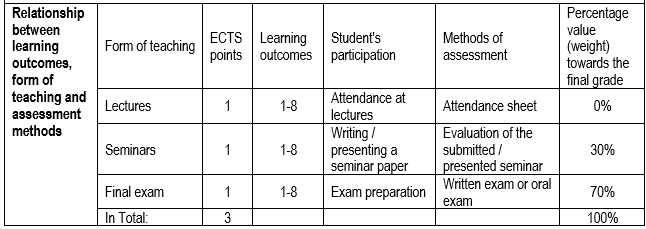The goal of the course is to acquire knowledge, skills and attitudes of nursing ethics, moral, moral principles, values, moral awareness and consciousness.
Nursing ethics. Philosophy, ethics, moral. Chosen ethical doctrines; ethics of virtue, ethics of love, ethics of theology, ethics of deontology, ethics of patient care. Bioethics, deontology, medical deontology. Beginnings of medical ethics and deontology. Moral values and duties of a nurse. System of moral values in nursing - moral features (containing yourself, relationship to patient, their family, colleagues, respecting a human's needs and values, respecting a human's right of choice, professional secret). Professional ethics and nursing (ethical codex - nursing associations). Ethical doubts in modern medicine; respecting a human's life from birth till death, euthanasia, nurse advocate of life, graceful passing – principles of care for incurable or terminal patients, organ transplantation, research in medicine and responsibility of a nurse.
Obavezna literatura:
- Kalauz S. Etika u sestrinstvu. Zagreb: Medicinska naklada; 2012.
- Zurak N. Medicinska etika. Zagreb: Medicinski fakultet Sveučilišta u Zagrebu; 2007.
- Švajger A, ur. Medicinska etika. (priručno štivo) 2. izd. Zagreb: Medicinski fakultet, Sveučilište u Zagrebu; 1995.
- Prlić N. Etika u sestrinstvu. Zagreb: Školska knjiga; 2014.
- Tucak A, Fatović-Ferenčić S. Medicinska etika. Zagreb: Medicinska naklada; 2011.
- HKMS. Etički kodeks. Etički kodeks. Zagreb: HKMS, 2005.
- Međunarodno vijeće medicinskih sestara i tehničara. Etički kodeks međunarodnoga vijeća medicinskih sestara. Zagreb: Hrvatska udruga medicinskih sestara, 2007.
Dopunska literatura:
- Matulić T. Bioetika. 3. izd. Zagreb: Glas koncila; 2012.
- Singer PA, Viens AM. Bioethics. New York: Cambridge University Press; 2008.
- Svjetsko liječničko udruženje. Priručnik medicinske etike. Zagreb: Medicinska naklada; 2010.
- Mandić N. Etika i psihijatrija. U: Muačević V, i sur. Psihijatrija. Zagreb: Medicinska naklada;1995. str. 247-53.
- Baccarini E. Kantovo nasljeđe i pitanje eutanazije. Filozofska istraživanja. 2002;517:30.
- Barišić P. Etika kreposti u suvremenom društvu. Filozofska istraživanja. 2002;507:15.
- Pozaić V. Čuvari života – radosti i tjeskobe djelatnika u zdravstvu. Zagreb: Centar za bioetiku FTIDI Zagreb; 1998.
- Pozaić V. Život prije rođenja. Zagreb: Centar za bioetiku FTIDI Zagreb; 1990.
- Volarić-Mršić A. Kultura života. Zagreb: Centar za bioetiku FTIDI Zagreb; 2002.
- Kubler-Ross E. Razgovori s umirućima. Zagreb: Oko tri ujutro; 1980.
- Babić S, Santrič V. Pravednost i pravo na zdravlje i zdravstvenu zaštitu. Zagreb: Medicinski fakultet Sveučilišta u Zagrebu; 1992.
- Orešković S, Babić S. Pravo na život. Zagreb: Medicinski fakultet Sveučilišta u Zagrebu; 1991.
- Kalauz S. Sestrinska etika u svjetlu bioetičkog pluriperspektivizma. Zagreb: Pergamena; 2011.
- Mohar P. Temelji medicinske etike in deontologije. Ljubljana: Zavod Republike Slovenije za šolstvo i šport; 1994.
- Tschudin V. Ethik in der Krankenpflege. Basel: RECOM; 1988.
- Fitzpatrick FJ. Ethics in Nursing Practice: Basic Principles and their Application. Indiana: Linacre Centre for the Study of the Ethics of Healthcare; 1988.
- Husted GL, Husted JH. Ethical decision making in nursing. 2. izd. St. Louis: Mosby; 1995.
- časopis Nursing Ethics – An International Journal for Health Care Professionals
Upon completion of this course, students will be able to:
- analyse ethics as a philosophical discipline and its historical development, the beginnings of nursing ethics, and the division of ethical theories.
- apply the principles of nursing ethics – the code of ethics for nurses and the declaration of human rights and patient rights.
- support human rights, child rights, and patient rights.
- evaluate the ethical relations of the nurse towards patients, their families, and associates.
- argue the importance of safekeeping and professional secrecy.
- defend the position of respect for human life from conception to death.
- argue the right to life and at the end of life contrary to the right to die.
- argue personal attitude in various ethical dilemmas in nursing practice.



